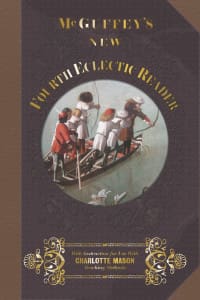McGuffey's Improvements to the 1857 Readers
What is the difference between the 1857 edition of the McGuffey Readers and the earlier edition? 
- The 1857 edition is the first edition with all six readers. The fifth and sixth readers were new for this edition, and were designed to cover high school level literature, reading, and elocution instruction.
- The 1857 is the last edition William Holmes McGuffey was personally involved with, thus the last edition that fully reflected his great knowledge of the classics, as well as his focus on virtue and values.
- This edition was revised and expanded in response to feedback from teachers who were using it.
- New and expanded teacher notes and instructions were included in each volume.
The widely-extended approval and patronage bestowed upon the Eclectic Educational Series for several years past, have given to them a constantly increasing demand. Their sale is not equaled by that of any other School Books in the United States. Such approval renders it the duty and privilege of the Publishers to sustain and increase their usefulness, by such improvements as are demanded by educational progress. With this view, McGuffey’s Eclectic Readers have been entirely remodeled. Such lessons as discriminating practical teachers had found the least interesting, have been removed, and others, with large additions—especially of primary matter— have been introduced into the Series. A careful attention to progression, by which the learner is led forward, step by step, along an easy gradation; a pure moral and religious sentiment, inculcated in interesting and instructive lessons; a neat typography and handsome style of publication, render them the best class-books for reading in the English language, and, at their very low prices, the cheapest. From the Fourth Reader, p. 4.
Of all of the reasons to choose the 1857 edition, the one I find most compelling is not just the McGuffey improvements, but the fact that this edition was the pinnacle of McGuffey's work. He built on all he had learned from the first edition, and made the 1857 Readers better. His instructions for articulation and elocution highlight the importance of spoken, as well as written communication, and these instructions alone are a valuable resource for homeschooling families. Most language arts curricula do not even mention articulation, and elocution is relegated to texts on public speaking, despite the fact that most student communication is verbal. The readers didn't just benefit practically from McGuffey's improvements — they also benefitted from his character. William Holmes McGuffey was a theologian, professor, and a man deeply concerned with the cultivation of wisdom and virtue in the rapidly expanding new nation. He saw the frontier moving west and tiny one-room schoolhouses springing up. Knowing that most of the teachers in these little schoolrooms were untrained, and had few resources (that sounds a bit like homeschool moms!), he designed the readers as a sort of "library in a book." Thus the 1857 Readers were designed to stand in for the libraries that might be found in big cities. A frontier school may not have the entire works of Shakespeare, but they could be introduced to some of his most famous passages, thus cultivating a taste for beautiful literature. Ideally the teacher would be able to relate the context of the play so that the passage would have deeper meaning, but if not, the passage itself was worthy of study. Students may never hear the great speeches of George Washington or Patrick Henry, but they could read, learn, and even perform them, using the simple readers that were part of almost every child's education in the nineteenth century. After this edition, others took over the publishing and editing of the series, and it lost something of the depth and character of McGuffey's own work. Whether used for instruction or copywork, narration, dictation, or recitation, or just for reading, the 1857 McGuffey Readers are a good choice for home-schooling families.
First Reader • Second Reader • Third Reader
Set of 1st, 2nd, and 3rd readers